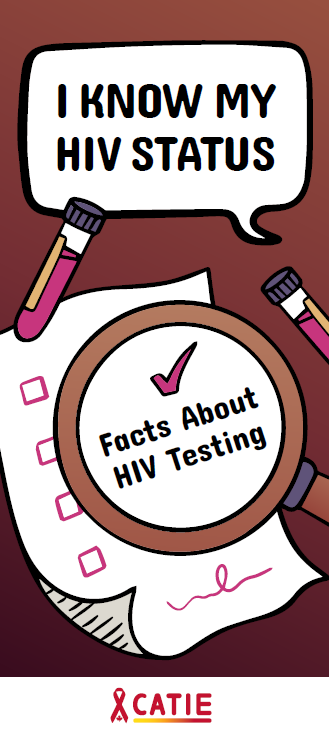Why should I get tested?
HIV testing is a great way to look after your health. It is also a great way to look after the health of your sex partners and the people you use drugs with.
If you have HIV, it is better for your health if you are diagnosed and start treatment as early as possible. With proper treatment and care, most people with HIV can stay healthy and live a long, full life.
Another important benefit of HIV treatment is that it helps prevent HIV from passing to others. Successful HIV treatment that lowers the amount of virus in your body to undetectable levels (called having an undetectable viral load), means that people with HIV:
- cannot pass HIV to their sex partners
- have a lower chance of passing HIV when sharing equipment for injecting drugs, but we don’t know by exactly how much
- will not pass HIV to a baby during pregnancy or delivery if they maintain an undetectable viral load throughout pregnancy
What kinds of HIV tests are available?
Most people get what is known as a standard HIV test. Blood is taken from a vein in your arm and sent to a laboratory for analysis. It can take up to two weeks to get your result.
Rapid testing is another option. With a rapid test, you get an initial result within a few minutes of doing the test. Rapid tests are screening tests. This means that if the test shows a positive result, you will need to get a standard HIV test to confirm the result. You might be able to get a rapid test from a healthcare provider or community worker, but this option isn’t available in every part of Canada. Anyone in Canada can get a rapid self-test, which you perform on yourself at home.
All HIV tests are very accurate.
If you get a test from a healthcare provider or community worker, it will only take a few moments to collect the blood sample, but the HIV test appointment can last up to 30 minutes. Your discussions with the person giving you an HIV test are confidential. If you test positive for HIV, your local public health department will be notified and they will work with you to contact your sex and drug use partners to encourage them to get tested.
When should I get tested?
Everyone has the right to have an HIV test in Canada. Some people get tested once, while other people get tested more often. Talk to a healthcare provider about how often you should have an HIV test.
HIV is most often transmitted during unprotected sex or by sharing drug use equipment.
Unprotected sex means that no effective HIV prevention strategy is used. Effective strategies for preventing HIV during sex include condoms, pre-exposure prophylaxis (PrEP) for people who are HIV negative, and successful HIV treatment for people who are HIV positive.
To learn more about these HIV prevention strategies, talk to a sexual health worker or a healthcare provider.
Get a test if you:
- have had unprotected sex with someone (or you were put at risk for HIV due to sexual violence)
- are pregnant or planning to get pregnant
- shared drug use equipment with someone
Some people who become HIV positive have symptoms (such as a fever, rash, or feeling like they have a severe flu) within the first month of infection. If you have any of these symptoms after a possible exposure to HIV, get tested right away.
The only way to know for sure if you have HIV is to get tested.
What do the results mean?
If you test HIV negative, it means that you do not have HIV. Depending on when you last had unprotected sex or shared drug use equipment you may have to repeat the test to be sure of the result. Ask the person who gives you your result about how often you should test in the future and what you can do to prevent HIV.
If you have a confirmed HIV positive result, it means that you have HIV. The person who gives you your result will talk to you about next steps and connect you with a healthcare provider, public health workers and other supports in your community to help you after your diagnosis. It can be a shock to learn you have HIV, but it is important to know that people with HIV who are diagnosed early and get the right care and treatment can live long, healthy and full lives. Being on successful treatment also means that you won’t pass HIV on to your sexual partners.
Getting connected to care and getting support are important first steps. Visit HIV411.ca to find services in your area.
Where do I get tested?
Many places offer HIV testing. Depending on where you live, you may be able to get an HIV test at a health clinic, doctor’s office, hospital, sexual health clinic, community organization or a public health unit. Self-tests can be ordered online and may be available for free from community organizations or for purchase in some pharmacies.
To find where you can get an HIV test in your area, visit HIV411.ca or call a sexual health hotline in your area.

